Sports
Where do Pakistan stand as World Cup gets closer?
Published
2 years agoon
By
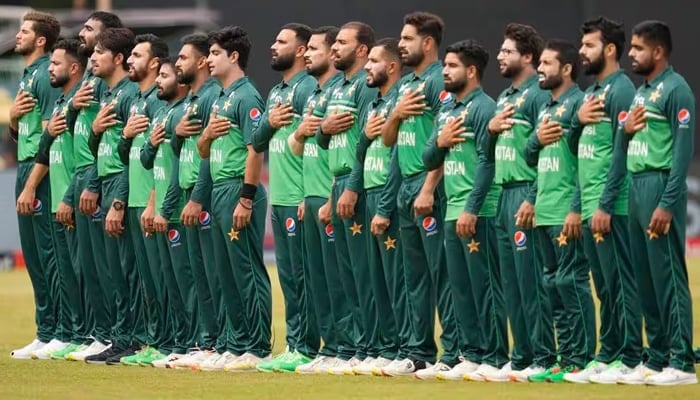
The Pakistan cricket team under the leadership of skipper Babar Azam failed to impress during the Asia Cup 2023 — the first substantial test of the Green Shirts in the One Day Internationals (ODIs).
Obvious flaws were seen from the very first game of the tournament, especially in batting and fielding but no improvements were made.
Pakistan’s top-order Fakhar Zaman, Imam-ul-Haq and Azam could not perform in accordance with expectations in the Asian event, which has raised serious concerns among the cricketing circles.
Here are the stats of them in the Asia Cup 2023:
| Player | Runs | Innings /Average |
| Fakhar Zaman | 65 | 4 / @ 16.25 |
| Imam ul Haq | 92 | 3 / @ 30.66 |
| Babar Azam | 207 | 4 / @51.75 |
It has to be mentioned that out of the 207 runs Azam scored, 151 came against Nepal while against the rest of the three teams (Bangladesh, Sri Lanka and India) he only managed to score a total of 56 runs.
Meanwhile, Abdullah Shafique only got a chance to bat in one match, which was a must-win encounter against Sri Lanka but the 24-year-old delivered, playing a classy knock which included his maiden ODI half-century and making his case for the World Cup 2023 much stronger.
Another positive from Pakistan’s batting was the consistent display from Mohammad Rizwan and Iftikhar Ahmed.
The wicketkeeper batter scored 195 runs in four innings at an impressive average of 97.50 which included a match-winning half-century against Bangladesh in the first Super Four encounter and another crucial knock of 86 runs against Sri Lanka in a must-win match.
Iftikhar also impressed with the bat, scoring 179 runs in three innings. His 47 off 40 against the Islanders were crucial as he helped the Green Shirts survive after an early collapse.
All in all, Pakistan would need to assess their options to fix their batting lineup. With Abdullah delivering and Saud Shakeel — who plays spin well — still yet to be tested, the Green Shirts, to an extent, can bring stability to their struggling batting.
Another big concern for the Pakistani team is the subpar performance of all-rounders, Shadab Khan, Mohammad Nawaz and Faheem Ashraf.
Shadab is the vice-captain of the team and the 24-year-old failed to step up big time when Pakistan required him the most.
In the Asian event, Shadab batted in three innings and he scored a total of 13 runs at an average of 4.33. Meanwhile, with the ball, he bowled 250 balls and conceded 245 runs while taking six wickets.
Out of his six wickets, four came against Nepal, who were the Asia Cup debutants.
Other than Shadab, Faheem batted in one inning scoring four runs. While he bowled in two innings, bowling a total of 102 balls and conceding 101 runs with only two wickets to his name.
Nawaz is another name that underperformed in spinning conditions. He batted in one inning and scored 12 runs. Meanwhile, with the ball, the left-armer bowled 102 balls and conceded 94 runs but failed to give Pakistan a breakthrough as he only bagged one wicket.
The stats are quite worrying, and with players like Usama Mir sitting on the bench and the ICC Cricket World Cup 2023 less than 20 days ahead, the Green Shirts need to analyse their options and fix their starting XI.
However, amid the chaos, Pakistan managed to justify the “Land of Pacers” tag as the pace trio of Shaheen Shah Afridi, Haris Rauf and Naseem Shah picked 26 wickets in the Asia Cup.
Shaheen, who is considered arguably the most dangerous bowler with the new ball, picked ten wickets in five innings. Haris bagged nine while Naseem got seven to his name.
Although, another big blow that must have left the already-shattered Pakistani team devastated was ESPNcricinfo’s news stating that pacer Naseem Shah is likely to miss the entire World Cup following a shoulder injury.
Pakistan have many pacers who can possibly cover for the 20-year-old with Zaman Khan and Shahnawaz Dahani leading the charts.
Pakistan are likely to announce their squad for the mega event soon and it would be interesting to see who makes the cut.
You may like
-


World Cup 2023: Pakistan opt to bowl first against Australia after winning toss
-


Good news: Fit-again Pakistan players practice ahead of Australia clash
-
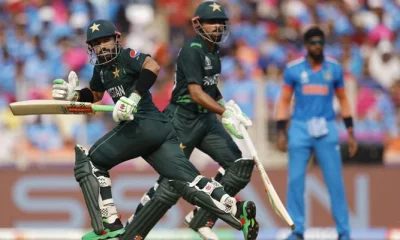

World Cup: Pakistanis believe Babar Azam, Mohammad Rizwan to be top run scorers
-


Four key India-Pakistan battles at World Cup
-
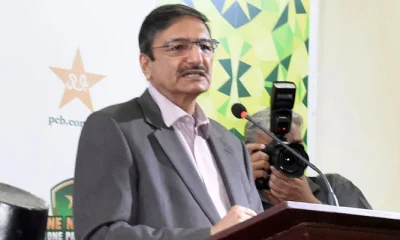

Pak vs Ind: PCB chief leaves for India tomorrow to watch World Cup blockbuster
-


Empty stadium trends as world’s biggest cricket ground fails to attract fans

In a unanimous verdict, a five-member bench of the Supreme Court on Monday declared civilians’ trials in military courts null and void as it admitted the petitions challenging the trial of civilians involved in the May 9 riots triggered by the arrest of Pakistan Tehreek-e-Insaf (PTI) chief Imran Khan in a corruption case.
The five-member apex court bench — headed by Justice Ijaz Ul Ahsan, and comprising Justice Munib Akhtar, Justice Yahya Afridi, Justice Sayyed Mazahar Ali Akbar Naqvi and Justice Ayesha Malik — heard the petitions filed by the PTI chief and others on Monday.
The larger bench in its short verdict ordered that 102 accused arrested under the Army Act be tried in the criminal court and ruled that the trial of any civilian if held in military court has been declared null and void.
The apex court had reserved the verdict earlier today after Attorney General of Pakistan (AGP) Mansoor Usman Awan completed his arguments centred around the domain and scope of the military courts to try the civilians under the Army Act.
At the outset of the hearing today, petitioner lawyer Salman Akram Raja told the bench that trials of civilians already commenced before the top court’s verdict in the matter.
Responding to this, Justice Ahsan said the method of conducting proceedings of the case would be settled after Attorney General of Pakistan (AGP) Mansoor Usman Awan completed his arguments.
Presenting his arguments, the AGP said he would explain to the court why a constitutional amendment was necessary to form military courts in 2015 to try the terrorists.
Responding to Justice Ahsan’s query, AGP Awan said the accused who were tried in military courts were local as well as foreign nationals.
He said the accused would be tried under Section 2 (1) (D) of the Official Secrets Act and a trial under the Army Act would fulfill all the requirements of a criminal case.
“The trial of the May 9 accused will be held in line with the procedure of a criminal court,” the AGP said.
The AGP said the 21st Amendment was passed because the terrorists did not fall in the ambit of the Army Act.
“Amendment was necessary for the trial of terrorists [then] why amendment not required for the civilians? At the time of the 21st constitutional amendment, did the accused attack the army or installations?” inquired Justice Ahsan.
AGP Awan replied that the 21st Amendment included a provision to try accused involved in attacking restricted areas.
“How do civilians come under the ambit of the Army Act?” Justice Ahsan asked the AGP.
Justice Malik asked AGP Awan to explain what does Article 8 of the Constitution say. “According to Article 8, legislation against fundamental rights cannot be sustained,” the AGP responded.
Justice Malik observed that the Army Act was enacted to establish discipline in the forces. “How can the law of discipline in the armed forces be applied to civilians?” she inquired.
The AGP responded by saying that discipline of the forces is an internal matter while obstructing armed forces from discharging duties is a separate issue.
He said any person facing the charges under the Army Act can be tried in military courts.
“The laws you [AGP] are referring to are related to army discipline,” Justice Ahsan said.
Justice Malik inquired whether the provision of fundamental rights be left to the will of Parliament.
“The Constitution ensures the provision of fundamental rights at all costs,” she added.
If the court opened this door then even a traffic signal violator will be deprived of his fundamental rights, Justice Malik said.
The AGP told the bench that court-martial is not an established court under Article 175 of the Constitution.
At which, Justice Ahsan said court martials are not under Article 175 but are courts established under the Constitution and Law.
After hearing the arguments, the bench reserved the verdict on the petitions.
A day earlier, the federal government informed the apex court that the military trials of civilians had already commenced.
After concluding the hearing, Justice Ahsan hinted at issuing a short order on the petitions.
The government told the court about the development related to trials in the military court in a miscellaneous application following orders of the top court on August 3, highlighting that at least 102 people were taken into custody due to their involvement in the attacks on military installations and establishments.
Suspects express confidence in mly courts
The same day, expressing their “faith and confidence” in military authorities, nine of the May 9 suspects — who are currently in army’s custody — moved the Supreme Court, seeking an order for their trial in the military court be proceeded and concluded expeditiously to “meet the ends of justice”.
Nine out of more than 100 suspects, who were in the army’s custody, filed their petitions in the apex court via an advocate-on-record.
The May 9 riots were triggered almost across the country after former prime minister Imran Khan’s — who was removed from office via a vote of no confidence in April last year — arrest in the £190 million settlement case. Hundreds of PTI workers and senior leaders were put behind bars for their involvement in violence and attacks on military installations.
Last hearing
In response to the move by the then-government and military to try the May 9 protestors in military courts, PTI Chairman Imran Khan, former chief justice Jawwad S Khawaja, lawyer Aitzaz Ahsan, and five civil society members, including Pakistan Institute of Labour Education and Research (Piler) Executive Director Karamat Ali, requested the apex court to declare the military trials “unconstitutional”.
The initial hearings were marred by objections on the bench formation and recusals by the judges. Eventually, the six-member bench heard the petitions.
However, in the last hearing on August 3, the then-chief justice Umar Ata Bandial said the apex court would stop the country’s army from resorting to any unconstitutional moves while hearing the pleas challenging the trial of civilians in military courts.
A six-member bench, led by the CJP and comprising Justice Ijaz Ul Ahsan, Justice Munib Akhtar, Justice Yahya Afridi, Justice Sayyed Mazahar Ali Akbar Naqvi, and Justice Ayesha Malik, heard the case.
In the last hearing, the case was adjourned indefinitely after the Attorney General for Pakistan (AGP) Mansoor Usman Awan assured the then CJP that the military trials would not proceed without informing the apex court.
Sports
World Cup 2023: Pakistan opt to bowl first against Australia after winning toss
Published
2 years agoon
By
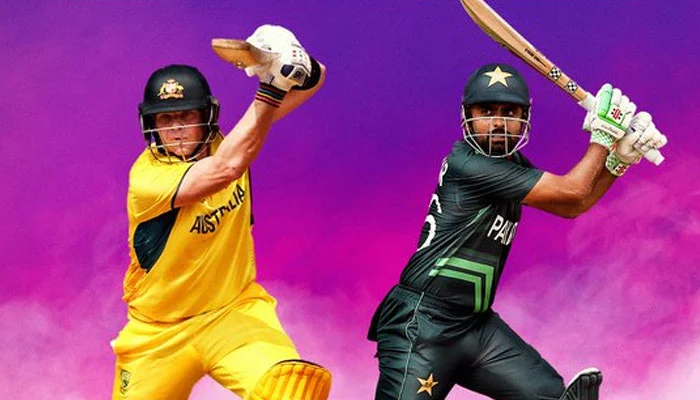
Pakistan has asked Australia to bat first after winning the toss in their fourth match of the ICC Men’s Cricket World Cup at the Chinnaswamy Stadium in India’s Bangalore on Friday (today).
Both the Green Shirts and Aussies are looking to clinch a victory, as both teams prepare to take on one another in the round-robin stage of the major cricket event.
The Babar Azam-led team has so far won two out of three total games played, while Pat Cummins side has only managed to secure one win out of its total three matches in the tournament.
For today’s match Pakistan have rested Shadab Khan and brought in Usama Mir as his replacement.
Playing XI
Pakistan: Abdullah Shafique, Imam-ul-Haq, Babar Azam (c), Mohammad Rizwan (wk), Saud Shakeel, Iftikhar Ahmed, Mohammad Nawaz, Usama Mir, Hasan Ali, Shaheen Afridi, Haris Rauf.
Australia: David Warner, Mitchell Marsh, Steven Smith, Marnus Labuschagne, Josh Inglis (wk), Glenn Maxwell, Marcus Stoinis, Mitchell Starc, Pat Cummins (capt), Adam Zampa, Josh Hazlewood.
Pakistan
PCB ‘dismisses’ objections over players support for Palestinians
Published
2 years agoon
By
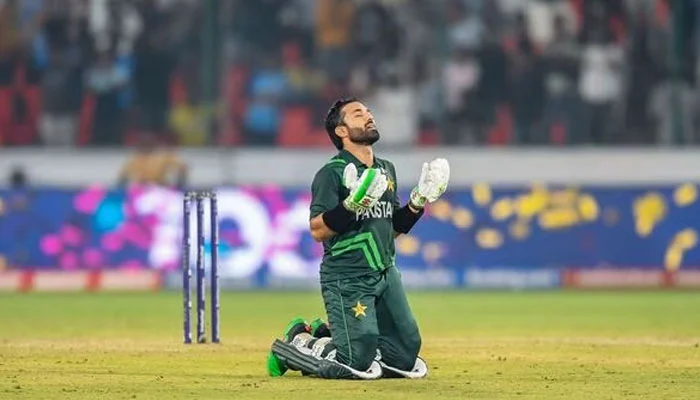
LAHORE: Pakistan’s cricket team, which is currently busy participating in the ICC Men’s T20 Cricket World Cup, has shown their firm support and shared their prayers for all Palestinians suffering at the hands of Israel.
However, there have been many questions raised by Indian fans and cricket experts on the players’ constant support for Palestine asking ICC — the governing body of the game — whether such moves were allowed in the tournament.
According to sources, the Pakistan Cricket Board (PCB) rejected the objections over players’ conduct saying: “The team’s expression of solidarity was a personal decision.”
Pakistan’s national team on Wednesday, posted a picture of the Palestinian flag on their individual X, formerly known as Twitter, accounts to show that they stand in solidarity with Palestine and that they are praying for the people suffering there including children.
☮️ ☮️ ☮️ ☮️ pic.twitter.com/r8E31Jsfya
— Shadab Khan (@76Shadabkhan) October 18, 2023
— Haris Rauf (@HarisRauf14) October 18, 2023
🤲🤲🤲🤲 pic.twitter.com/2hH4Gjmyhn
— Muhammad Nawaz (@mnawaz94) October 18, 2023
Prior to this Pakistan’s wicket-keeper batsman, Mohammad Rizwan, dedicated the team’s victory over Sri Lanka to his “brothers and sisters in Gaza”.
This was for our brothers and sisters in Gaza. 🤲🏼
— Muhammad Rizwan (@iMRizwanPak) October 11, 2023
Happy to contribute in the win. Credits to the whole team and especially Abdullah Shafique and Hassan Ali for making it easier.
Extremely grateful to the people of Hyderabad for the amazing hospitality and support throughout.
Meanwhile, Indian fans and cricket experts used the team’s support for Palestine to create controversies, claiming that the national team had violated ICC rules.
Sources from PCB added that the team is “allowed to express whatever they wanted to,” and that the players “did not violate any code of conduct by the ICC or PCB”.
The Health Ministry in Gaza reports that at least 3,061 Palestinians have died and over 13,750 more have been injured as a result of Israel’s shelling.
Pakistan has categorically condemned the Israeli atrocities and called for an immediate cessation of the bombardment, which has not even spared hospitals or schools, in solidarity with its Palestinian brothers and sisters.
Even Pakistani cricket legends who are not participating in the team anymore showed their support for Palestine.
🤲🏻🤲🏻 pic.twitter.com/8i20CX2Hka
— Kamran Akmal (@KamiAkmal23) October 18, 2023
#FreePalestine pic.twitter.com/IHC74YsxQH
— Zia Ul Haq (@zuh_leftarmfast) October 18, 2023
Moreover, Pakistan is set to face Australia tomorrow (Friday) in M Chinnaswamy Stadium, Bengaluru after a few days of rest.


Supreme Court annuls trials of civilians in military courts

Sea conditions ‘very high’ as Cyclone Tej moves towards northwestward

IMF condition: ECC set to green light gas tariff hike today

Barwaan Khiladi: Kinza Hashmi discusses her role as Alia

Snap launches tools for parents to monitor teens’ contacts

WATCH: Pakistani traveller deported from Dubai for damaging plane mid-air

Learn First | How to Create Amazon Seller Account in Pakistan – Step by Step

Sajjad Jani Funny Mushaira | Funny Poetry On Cars🚗 | Funny Videos | Sajjad Jani Official Team

